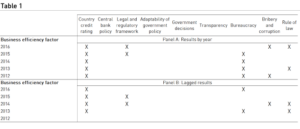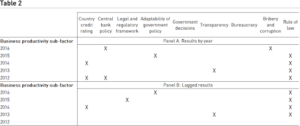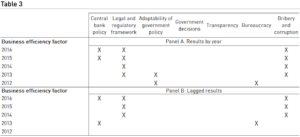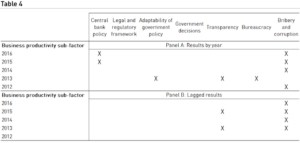
Business efficiency and productivity (part II)
In this Criterion of the Month, we continue to explore the relationship between business efficiency and productivity, and the institutional framework. Evidence presented in our February 2017 Criterion showed that institutions consistently played a significant role in the efficiency and productivity of the private sector. At the time, we suggested that a competitiveness strategy focus on institutional stability and predictability was a fundamental driver of efficiency and productivity. Using the same stepwise regression tests we employed then, we now attempt to evaluate the role of the different components of the institutional framework.
The first set of tests thus take the efficiency of business factor as the outcome and the components of the institutional framework as the input.

In the first step of the test, we assess the role of those components by year from 2012 to 2016. We find that the country credit rating and the limited impact of bureaucracy on business activities are consistently significant. The next step of test (lagging inputs by a year), supports the importance of the credit rating indicator for business efficiency, while the bureaucratic impact loses some significance. In the second set of tests (see Table 2) we replace business efficiency with business productivity as the output variable.

In this context, the importance of credit rating drops significantly and simultaneously that of the rule of law increases throughout the period of study. Lagging the input indicators by a year leads to similar results. Rule of law is the only input variable that is consistently significant for productivity.
The lack of significance among the other components of institutional framework can be explained by considering that the country credit rating and the rule of law can absorb the significance of those components. This is because the efficiency of the government policy implementation and transparency, for example, could be encompassed by the credit rating and rule of law measures. We thus run an additional set of tests after dropping both indicators, credit rating and rule of law.
In the case of business efficiency (see Table 3), the results highlight that the quality of the legal and regulatory system, and the limiting of bribery and corruption are its main drivers in both, the by-year and lagged tests.

It is interesting to note that the transparency and the effectiveness of decisions indicators have no significance in both tests, although the government policies’ adaptability to changes in the economy is found to have been a driver of business efficiency in 2012 and 2013. For business productivity, the bribery and corruption indicator is of fundamental consequence (see Table 4).

It is important to indicate, in addition, that transparency becomes significant during some of the years considered. Interestingly, in the 2013 test, the only year in which bribery and corruption is not significant, the latter is replaced by the government policies’ adaptability to changes in the economy, the limited impact of the bureaucratic structure on business activities, and by increasing the transparency of government policy-making processes.
These results support some of our initial propositions. In this regard, it is important to highlight the significance of the quality of the legal and regulatory system, the upholding of the Rule of Law and the credit rating indicator which are all conducive towards an institutional framework that is stable and predictable, not to mention effective in achieving its objectives.
Research Information & Knowledge Hub for additional information on IMD publications
The Qualios case tracks the search, negotiations and ultimate acquisition of an industrial, family-owned SME in Southern Germany. Using a variety of materials, including sophisticated composites, the company produces customized, high-quality braid...
This paper investigates why firms facing identical carbon-pricing incentives exhibit heterogeneous decarbonization trajectories. We address this question through a theoretical framework that conceptualizes national institutional quality and innova...

After being hit with US tariffs that climbed to 50 per cent over its purchases of Russian oil, India has now struck a deal with the world’s largest economy to cut those duties to 18 per cent, sending the rupee and local markets sharply higher. All...
The fourth industrial revolution (I4.0) is critically relevant to the future of business management. In this study, we theoretically examine I4.0 investment and implementation from a social capital perspective. By explicating the various forms of ...
Escalation Dominance—the ability to credibly threaten escalation to higher levels of conflict while convincing adversaries you would prevail at those levels—depends on unity. So says conventional wisdom. A coherent government that can demonstrate ...
The past year has shown how geopolitical disruptions can simultaneously raise risk levels and generate new opportunities across sectors. Trade fragmentation, intensifying strategic competition in technology, and pressure on supply chains have made...
Research Information & Knowledge Hub for additional information on IMD publications
in Research Policy 13 February 2026, ePub before print, https://doi.org/10.1016/j.respol.2026.105432
Research Information & Knowledge Hub for additional information on IMD publications
in I by IMD
Research Information & Knowledge Hub for additional information on IMD publications
Research Information & Knowledge Hub for additional information on IMD publications
in European Management Review 23 January 2026, ePub before print, https://doi.org/10.1111/emre.70043
Research Information & Knowledge Hub for additional information on IMD publications
Research Information & Knowledge Hub for additional information on IMD publications
in I by IMD
Research Information & Knowledge Hub for additional information on IMD publications
in I by IMD
Research Information & Knowledge Hub for additional information on IMD publications
Research Information & Knowledge Hub for additional information on IMD publications
Research Information & Knowledge Hub for additional information on IMD publications





